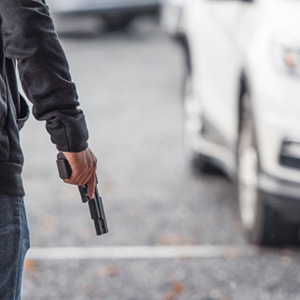 Are you facing charges related to illegal possession of a weapon in Virginia and unsure of your options? Knowing what constitutes illegal possession and the potential outcomes you may face can have significant ramifications on the outcome of your case and life afterward. Prepare yourself with this article where we discuss:
Are you facing charges related to illegal possession of a weapon in Virginia and unsure of your options? Knowing what constitutes illegal possession and the potential outcomes you may face can have significant ramifications on the outcome of your case and life afterward. Prepare yourself with this article where we discuss:
- How Virginia defines the illegal possession of a weapon.
- A high-level analysis of gun violence in Virginia.
- Where the “self-defense” approach falls short in many legal cases.
What Constitutes “Illegal Possession Of A Weapon” In Virginia?
In Virginia, individuals are not required to be licensed in order to possess a weapon. However, there are circumstances in which possession of a weapon can be illegal. For example, if a firearm is stolen and you are found to have it, you would be considered to have obtained it unlawfully.
Additionally, if a person is a felon, they are prohibited from possessing firearms in Virginia. Thus, being in possession of a weapon would be a violation of the law. Similarly, individuals who have been involuntarily committed to a mental health hospital are also prohibited from possessing firearms. Furthermore, carrying a concealed weapon without a concealed weapon permit is also a crime in Virginia.
What Is The Rate Of Gun Violence In Virginia?
While Virginia may not rank among the country’s highest gun violence rates, it is unlikely to be ranked among the states with the lowest rates, falling somewhere in the middle of the scale rather than at the bottom when considering gun violence statistics.
The prevalence of gun violence can vary depending on the location. In cities such as Richmond, Norfolk, and some areas in Northern Virginia, there is a significant rate of gun-related violence. This includes homicides and deaths resulting from gun violence, as well as the use of firearms in crimes like robberies and home invasions. It is not uncommon for individuals involved in drug distribution to possess firearms as well.
The issue of gun violence is a significant concern for law enforcement officials and judges, particularly in areas like Richmond. The widespread presence of firearms in these circumstances has raised significant concerns and prompted attention from law enforcement and the judicial system.
Can “Self-Defense” Be Used As A Defense In Weapon Charges In Virginia?
In a concealed weapon case, the concept of self-defense may not be applicable as the crime focuses on carrying a concealed weapon rather than the intent to use it for self-defense. The concealment of the weapon from plain sight is the basis for the charge, and whether or not the person intended to use it for self-defense is likely to be deemed irrelevant.
In cases involving firearm possession by a felon, individuals convicted of a felony are prohibited from possessing a firearm. Therefore the argument of self-defense may not be viable whatsoever. However, specific provisions in the law may allow felons to possess certain weapons within their residence or immediate surroundings, such as a stun gun. While self-defense can be a defense in various charges where a weapon is used, it is less likely to be a viable defense in cases specifically related to the possession of prohibited weapons.
What Are Possible Outcomes And Options For Individuals Facing Weapon Charges In Virginia?
When facing weapons charges, plea bargains can be a viable option depending on the circumstances of the case. If there are factual difficulties for the prosecution or other weaknesses in the case, it may be possible to negotiate a plea agreement.
For example, if a felon is charged with possession of a firearm and has been convicted prior of a violent offense, which carries a potential five-year sentence, there could be an opportunity to negotiate the charge down to a two-year sentence if there are issues that may weaken the prosecution’s case. In some instances, if there were problems with an illegal search of a person or vehicle, the prosecutor might offer a misdemeanor charge instead. Plea bargains provide an opportunity to reach a potentially more favorable agreement than the original charge.
However, diversion programs may not typically be available in weapons cases. Factors such as a prior felony conviction or the nature of the weapon involved may exclude individuals from diversion options. Additionally, due to concerns about gun violence, some judges may be inclined to handle gun-related cases more severely, which could result in exclusion from diversion programs.
Ultimately, the decision to pursue a plea bargain or take the case to trial depends on the specific circumstances and the defense’s strength. If the case is weak enough, it may be an option to plead not guilty and proceed to trial.
For more information on Illegal Possession Of A Weapon In Virginia, a free initial consultation is your next best step. Get the information and legal answers you are seeking by calling (804) 621-0854 today.